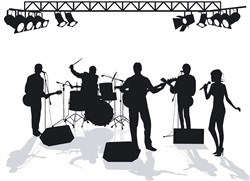In terms of the Copyright Act of 1978, copyright vests in a number of so-called 'works', as defined in the Act. This includes literary works (such as the lyrics of a song) and musical works (such as a melody).

© scusi - Fotolia.com
This copyright gives the owner - usually the person who created the work - the exclusive right to perform certain actions in relation to that work, or to allow others to do so.
This would include copying and adapting the work, performing the work in public or broadcasting it over the radio or on television. Anybody performing any of these actions without the consent of the copyright owner is guilty of copyright infringement.
"To ensure that you have the right to perform one of the actions reserved for the copyright owner, it is necessary to obtain a license from him," says Adre Greeff of Adams & Adams law firm. "However, it would be very difficult for each and every person or entity that wishes to play music in his store or restaurant to contact each and every artist whose music he wishes to use."
Collection agencies
This is where so-called collection agencies come in. Collection agencies are established in terms of the Copyright Act and the regulations promulgated in terms of the Act. These agencies act as an intermediary between copyright owners and those wishing to use the copyrighted works. The main collection agency in South Africa is the Southern African Music Rights Organisation (SAMRO).
SAMRO was created in 1961 representing only a few South African composers and music producers and has since grown to represent over 12 000 music creators. This includes composers, lyricists, music producers and recording artists. SAMRO collects license fees from music users and distributes it in the form of royalties to its members, not only locally but also internationally through its affiliation with a number of international collecting societies.
There are two types of licenses: broadcasting licenses and general licenses. Broadcasting licenses are issued to radio and television broadcasters who wish to broadcast music as part of its programming. General licenses are issued to every other type of music user, such as shops, restaurants, bars, and nightclubs. License agreements are negotiated on an individual basis with each music user.
Nature of premises
"Before any license agreement is concluded, a SAMRO consultant will visit the premises at which the music will be used or from which the music will be broadcast to assess the nature of the premises, the number of people that will be exposed to the music and any other factors that could affect the amount of license fees payable. This information is also used to determine who the beneficiaries of the royalties collected would be," says Greeff.
It is worth noting that, in terms of South African case law, even having a radio playing in a factory for the benefit of its workers, qualifies as a public broadcast for which a license must be obtained. "It is therefore advisable to find out whether any proposed music use qualifies as use for which a license is necessary. This information and much more about SAMRO, its workings, categories of music creators and types of music users who must obtain licenses can be found on its website at www.samro.org.za," concludes Greeff.

















































